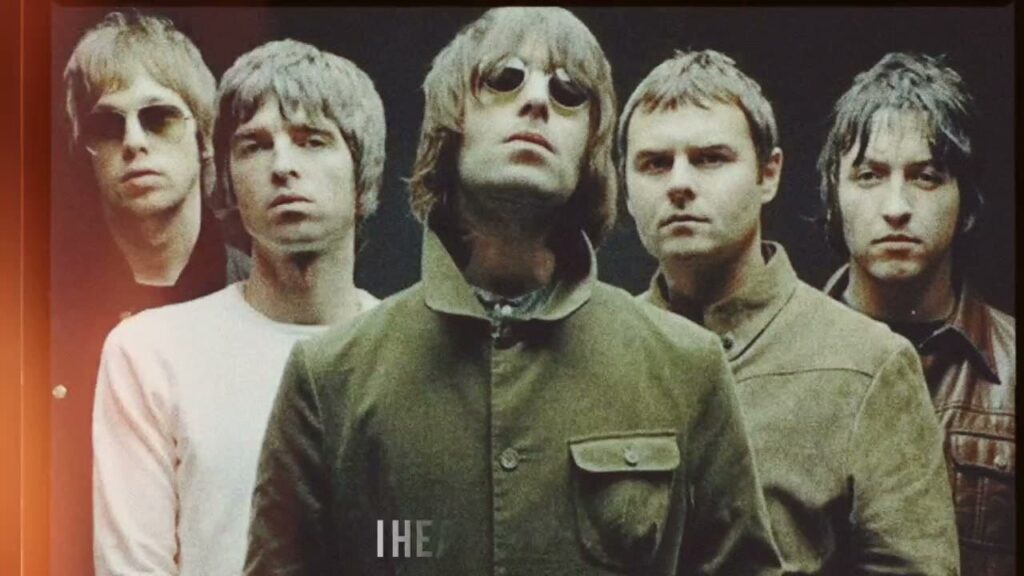
A Beacon of Hope in a World of Uncertainty: Rediscovering Oasis’s Enduring Ballad, “Wonderwall”
Released on October 30, 1995, the anthemic ballad “Wonderwall” by the iconic Britpop band Oasis became an instant classic, resonating deeply with a generation navigating the complexities of life and love. Though it narrowly missed the top spot in the UK Singles Chart, peaking at number 2, its impact was undeniable, lingering in the charts for weeks and ultimately becoming one of the defining songs of the decade. Across the Atlantic, it also found significant success, reaching number 8 on the US Billboard Hot 100, marking Oasis’s sole top 10 hit in America. This melancholic yet hopeful tune, penned by the band’s lead songwriter Noel Gallagher for their seminal second album, (What’s the Story) Morning Glory?, encapsulates the feeling of finding solace and hope in an uncertain world, perhaps in the form of another person who becomes a guiding light.
The story behind “Wonderwall”, like many tales from rock and roll history, has a touch of romantic ambiguity. Initially, Noel Gallagher suggested it was about his then-girlfriend, Meg Mathews. He painted a picture of her going through a difficult time with her business, and the song’s sentiment was one of reassurance, a belief in her strength to navigate life’s challenges and, perhaps, even help him through his own. However, years later, after their divorce, Gallagher offered a different interpretation, stating that the song was not about Mathews at all, but rather about an imaginary friend who would come and save him from himself. This shift in explanation only added to the song’s mystique, allowing listeners to project their own meanings and experiences onto its heartfelt lyrics.
The term “wonderwall” itself adds another layer to the song’s enigmatic nature. Gallagher has mentioned that the title was inspired by George Harrison’s 1968 solo album, Wonderwall Music, which was the soundtrack to a psychedelic film of the same name. Beyond this connection, the meaning of “wonderwall” within the song is open to interpretation. Some believe it represents a person who provides unwavering support and understanding, a constant in a turbulent existence. Others see it as a metaphor for an inner strength or a source of inspiration that helps one overcome obstacles. Liam Gallagher, the band’s charismatic frontman, once offered a characteristically cryptic explanation, suggesting a “wonderwall” is like finding that elusive bus ticket you desperately need – a moment of triumphant relief.
Lyrically, “Wonderwall” is a poignant exploration of unspoken feelings and the hope for connection. The opening lines, “Today is gonna be the day that they’re gonna throw it back to you / By now you should’ve somehow realized what you gotta do,” 1 carry a sense of anticipation and perhaps a nudge towards taking action. The narrator acknowledges the difficulty in expressing true emotions with the lines, “There are many things that I would like to say to you / But I don’t know how.” Yet, the chorus erupts with a powerful declaration of hope and reliance: “Because maybe / You’re gonna be the one that saves me / And after all / You’re my wonderwall.” This simple yet profound sentiment resonates with the universal desire for someone to believe in, someone who can offer salvation or simply a guiding hand.
Musically, “Wonderwall” marked a slight departure from the raw, guitar-driven sound of Oasis’s debut album, Definitely Maybe. While still rooted in rock sensibilities, it incorporated a more melodic and introspective approach. Noel Gallagher’s acoustic guitar forms the foundation of the song, complemented by the atmospheric mellotron played by Paul “Bonehead” Arthurs and a distinctive drum break by Alan White. Liam Gallagher’s vocal delivery, often described as raw and emotive, perfectly captures the yearning and vulnerability of the lyrics, making the listener truly feel the weight of the narrator’s hopes and uncertainties.
Even decades after its release, “Wonderwall” continues to hold a special place in the hearts of many. Its themes of hope, connection, and finding strength in others remain timeless and universally relatable. Whether it evokes memories of youthful romance, navigating life’s challenges, or simply the vibrant energy of the Britpop era, “Wonderwall” stands as a testament to Oasis’s songwriting prowess and their ability to craft songs that become deeply ingrained in the soundtrack of our lives. It’s a song that reminds us that even amidst the chaos, there’s always the possibility of finding our own “wonderwall” – whatever that may be – to help us through.